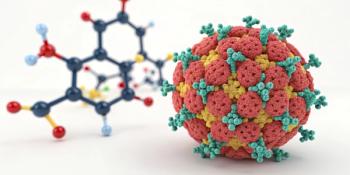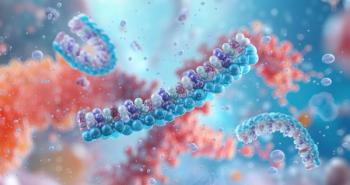
Strong Results for a New System for Delivering Gemcitabine in Bladder Cancer Patients
The FDA approved the system in September 2025.
A novel drug-delivery system has demonstrated effectiveness in treating specific bladder cancer patients whose tumors previously did not respond to conventional therapies.
TAR-200 was found to eliminate tumors in 82% of patients participating in a phase 2 clinical trial for people with high-risk nonmuscle-invasive bladder cancer whose disease was previously resistant to treatment. Approximately 70% of new cases of bladder cancer are classified as nonmuscle invasive.
The impressive results of the SunRISe-1 trial,
“Traditionally, these patients have had very limited treatment options,” Sia Daneshmand, M.D., director of urologic oncology with
In July 2025, the FDA granted priority review for TAR-200 as therapy for patients with high-risk nonmuscle invasive bladder cancer that does not respond to Bacillus Calmette-Guérin therapy, including carcinoma in situ with or without papillary tumors. In early September 2025, the FDA
The standard treatment for this type of bladder cancer is Bacillus Calmette-Guérin (BCG), inactivated tuberculosis bacteria derived from a type of Mycobacterium bovis, but recurrence is a problem.
TAR-200 is a small, pretzel-shaped drug-device combination that contains the chemotherapy medication gemcitabine and is inserted into the bladder via a catheter. Once in place, TAR-200 gradually and steadily releases gemcitabine into the bladder over a three-week treatment cycle.
The SunRISe-1 trial extracted data from 85 patients at 144 global locations, including the Keck Hospital of USC, using this delivery method, and all patients had high-risk non-muscle-invasive bladder cancer and previously received treatment but saw their cancer return.
In the trial, urologic oncologists treated patients with TAR-200 every three weeks for six months and then four times a year for the next two years. In the majority of patients who took part in the trial, the cancer disappeared after just three months of treatment and almost 50% of patients were still cancer-free more than a year later.
Daneshmand explained that gemcitabine usually has been delivered to the bladder as a liquid solution and only remains in the bladder for a few hours, which has shown limited effect in destroying the cancer. That’s not true with the TAR-200 delivery system.
“The theory behind this study was that the longer the medicine sits inside the bladder, the more deeply it would penetrate the bladder and the more cancer it would destroy,” said Daneshmand, who has been researching TAR-200 since 2016. “And it appears that having the chemotherapy released slowly over weeks rather than in just a few hours is a much more effective approach.”
The study also revealed that administering TAR-200 along with cetrelimab, another immunotherapy drug, did not prove as effective as TAR-200 on its own and had more side effects. That combination was dropped by the system’s maker, Johnson & Johnson.
“We are at an exciting moment in history,” Daneshmand said. “Our mission is to deliver cancer-fighting medications into the bladder that will offer lasting remission from cancer, and it looks like we are well on our way toward that goal.”
The 85 patients in the trial will continue to be followed for another year, though the study is closed to new participants.
Newsletter
Get the latest industry news, event updates, and more from Managed healthcare Executive.























